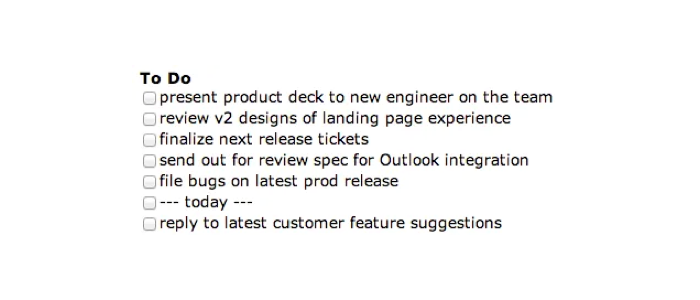How Am I Going To Move My Product Forward Today?
The role of a product manager is a broad one and there are variety of tasks you could be involved with each day. You could be performing core product responsibilities including conducting a customer interview, triaging incoming bugs, reviewing a new design, authoring a feature spec, brainstorming improvements for your next release, testing the latest release, and more. Or you could be performing team activities including preparing a presentation on the updated roadmap or on-boarding new team members. Add to that the constant meetings and emails you have to attend and respond to each day. This doesn’t even include the many non-role related activities that end of filling your day.
It’s easy to become overwhelmed as a product manager with all these tasks, it’s often difficult to figure out where you should be spending your time, and it may result in simply becoming reactive and ending up doing what’s simply most urgent at the moment.
To help combat this, I wanted to share a simple technique that I use to try to bring some control to my overall day. We have a saying at LinkedIn that you can’t fix what you don’t measure and I apply that same philosophy to help me prioritize my day-to-day responsibilities as a product manager. I start each day by asking how am I going to move my product forward today? I detail in my to do list the top 3-5 things I plan on accomplishing that day. With each item I add to the list, I think critically about how exactly that will result in moving my product forward, how much of an impact it will have relative to previous tasks that I have accomplished, and whether those are the most critical things to accomplish today. Then the next morning I go back through yesterday’s list, check off the ones I actually did end up accomplishing, and reformulate the list for that day.
While this is by no means a comprehensive framework for deciding how to prioritize your responsibilities, I find it an effective means by which to force self-awareness and reflection in less than fifteen minutes each day.
The first thing you’ll notice when you start this technique is that you are rarely able to accomplish even the 3-5 most important things that you set out to accomplish that day. And it thus becomes an effective strategy for improving your own estimation skills for how long a given task will take. Technology organizations are terrible at estimating how long projects will take and building this intuition for your own tasks is a critical first step to improving this. Beyond improving your estimation skills, it’s also a great forcing function for figuring out where exactly your day went and why you weren’t able to accomplish as much as you would have liked. It enables you to think about ways to act differently the next day to ensure you do accomplish your own daily goals.
The second thing you’ll start to notice is the relative importance of various tasks on your list. After you get to the point where you can accomplish the tasks that you set out to accomplish, you’ll start to realize that you may have not picked the most important, the most leveraged, or the most time-sensitive tasks to accomplish each day. And you’ll start to think more critically about which tasks to even put on your daily list.
Finally, you’ll start to see tasks that make it on your list each day but never get accomplished and simply keep rolling over to the next day. There are a variety of potential reasons for this: maybe it really wasn’t that important, maybe you are blocked by someone else on achieving it, or maybe you really just don’t want to accomplish that task. As you see these tasks constantly being pushed back, it’ll give you an opportunity to re-evaluate if it still makes sense for you to accomplish it and how you can make it happen.
So start your day tomorrow by asking how am I going to move my product forward today?
Whenever you’re ready, here are 3 ways I can help:
AI Productivity: Learn how leading product managers use AI to become faster, smarter, and gain super powers beyond their traditional role.
Mastering Product Management: Accelerate your product career by learning rigorous frameworks for each PM deliverable, from crafting a strategy to prioritizing a roadmap.
Product Innovation Strategy: Building a new product? Learn how to leverage the Deliberate Startup methodology, a modern approach to finding product/market fit.


